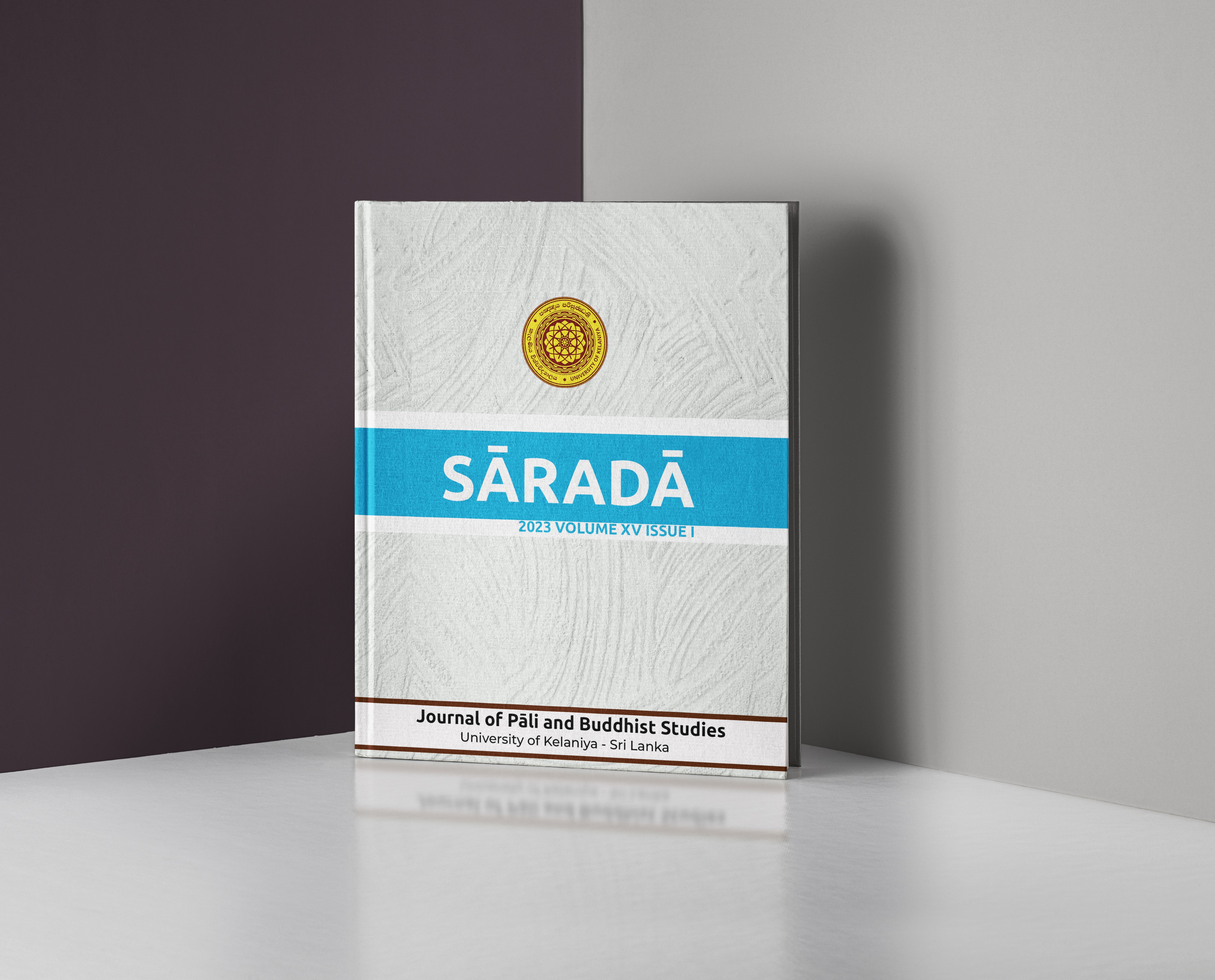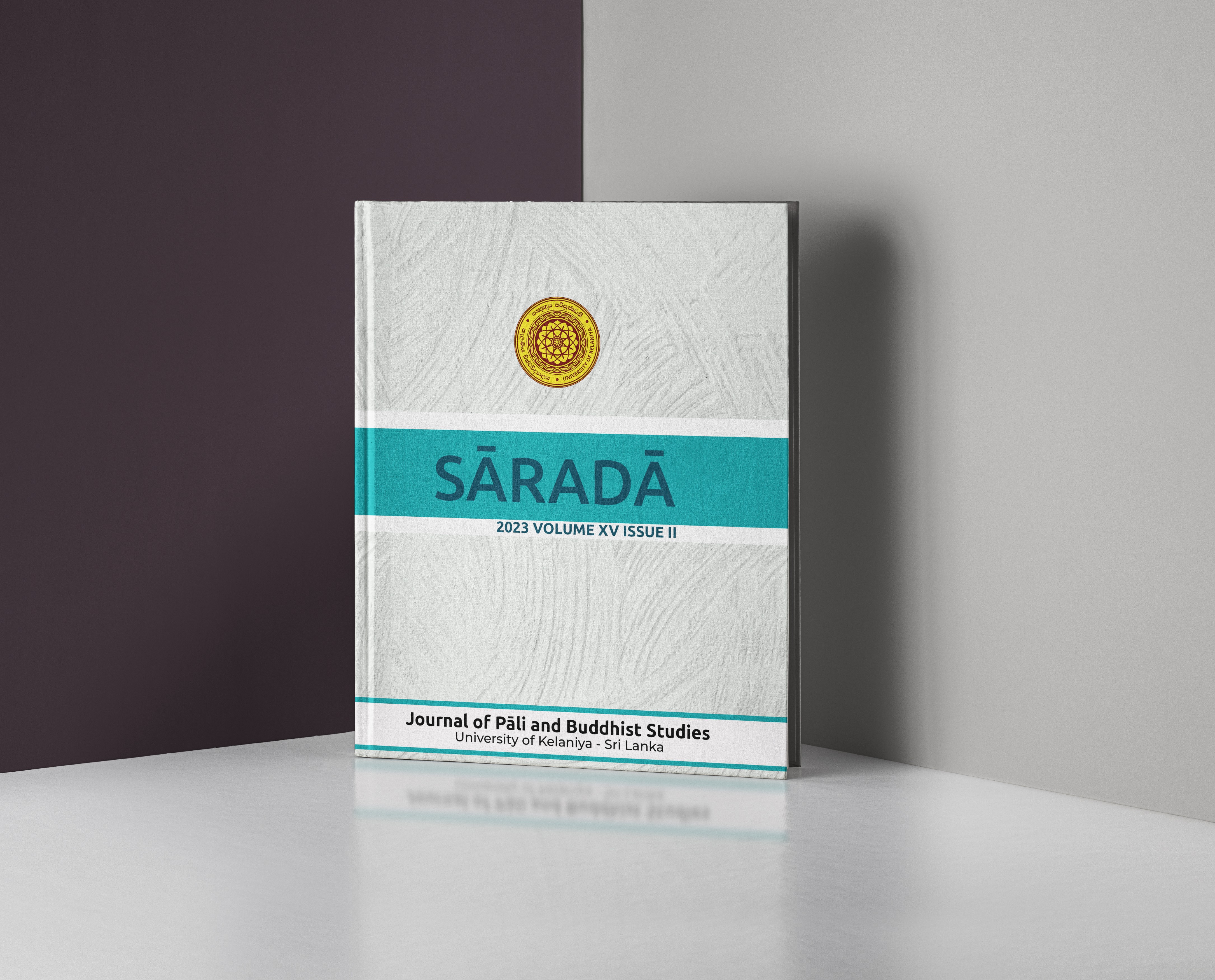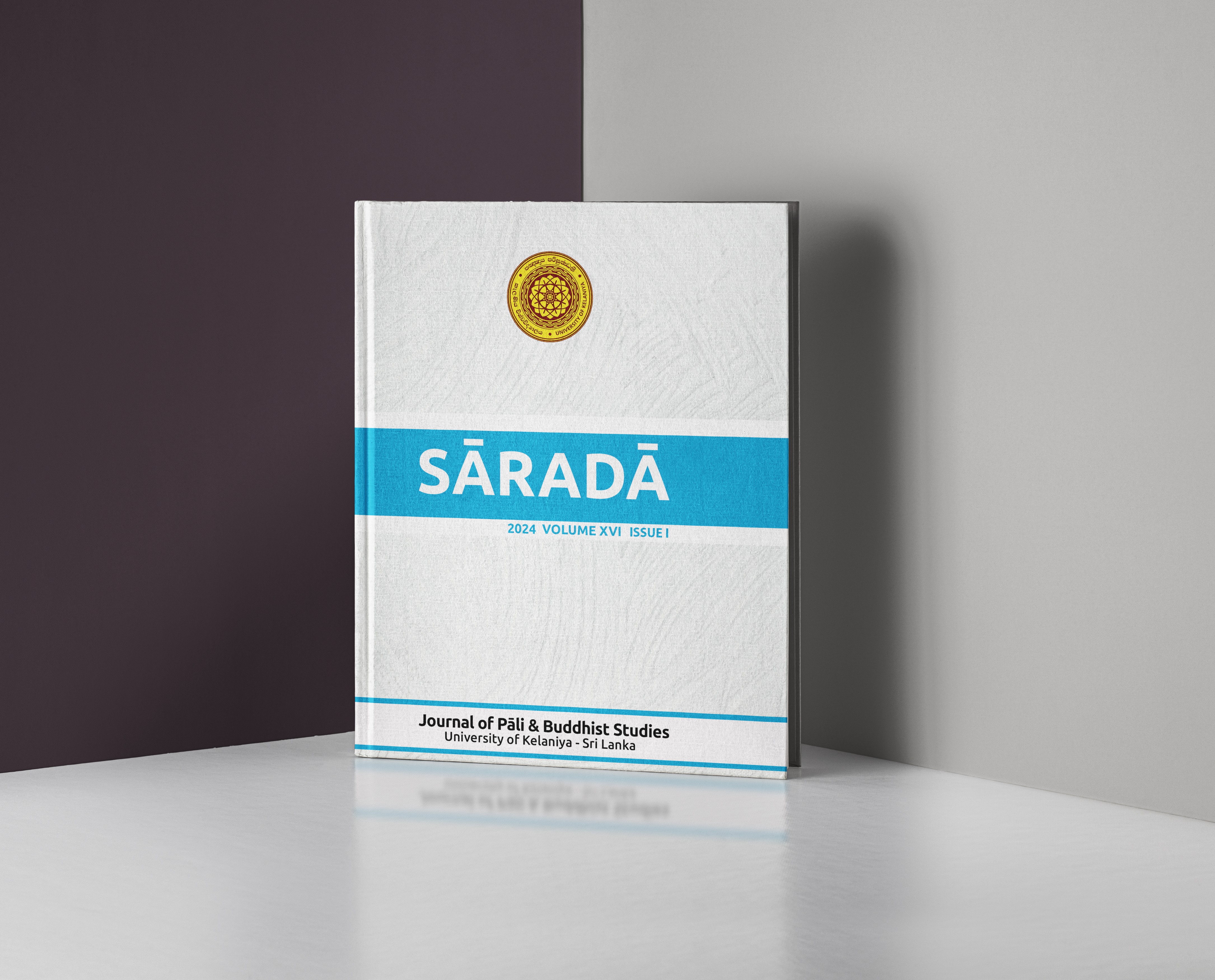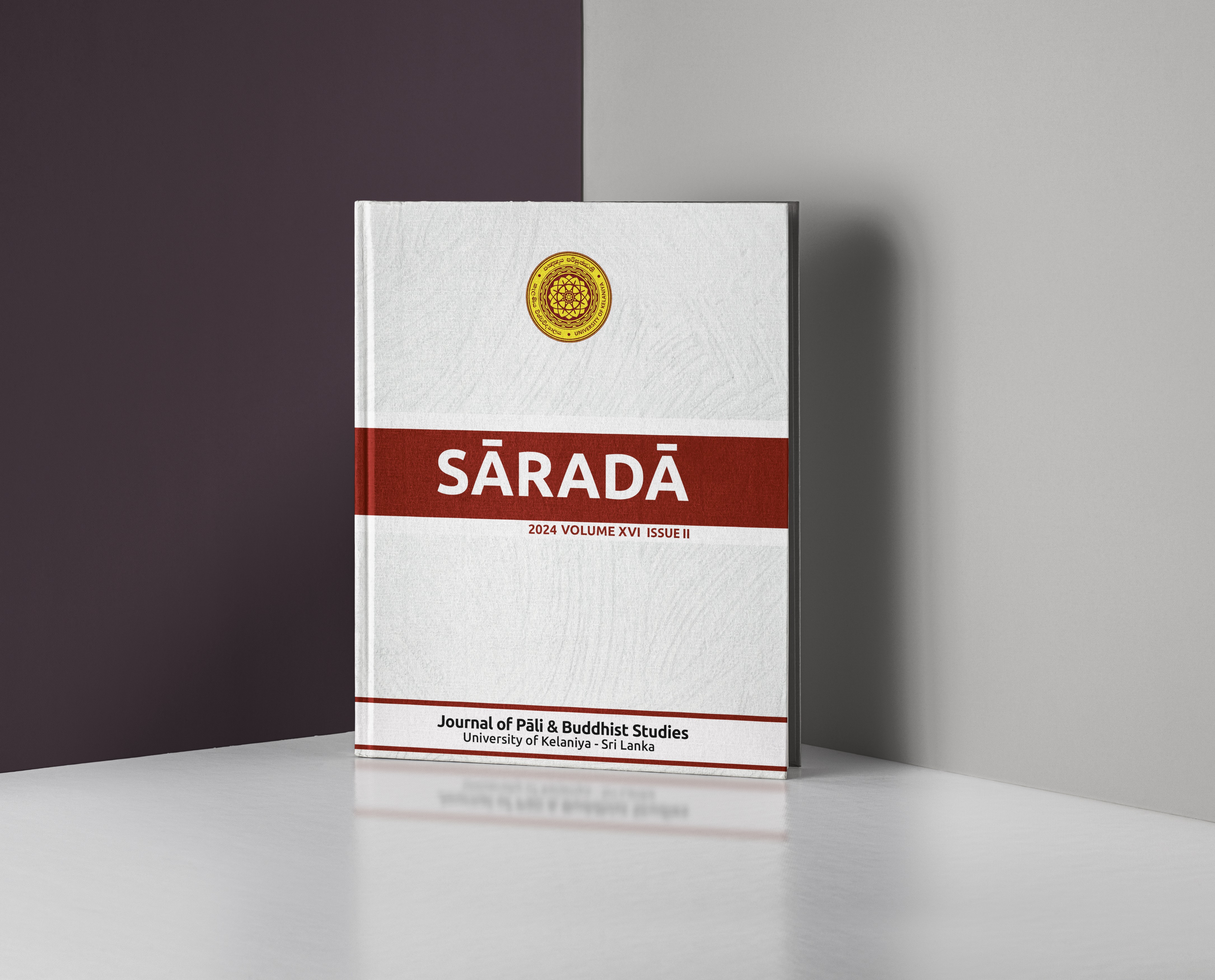sāradā
සාරදා
කැලණිය විශ්වවිද්යාලයීය පාලි හා බෞද්ධ අධ්යයනාංශ ශාස්ත්රීය සංග්රහය
Sāradā Journal of Pali & Buddhist Studies is a scholarly, peer-reviewed, and open access academic journal dedicated to advancing knowledge and research in the fields of Pali, Buddhism, and related areas of study. Published under the auspices of the Department of Pali & Buddhist Studies, Faculty of Humanities, University of Kelaniya, Sri Lanka, the journal maintains a strong commitment to academic integrity, intellectual rigor, and global scholarly engagement. As an indexed journal, it ensures wide accessibility and visibility, thereby encouraging the dissemination of high-quality research to a broad and diverse readership.
The journal welcomes original research articles, both theoretical and empirical, that contribute to the deeper understanding of Buddhist teachings, philosophy, history, culture, and their contemporary applications. It particularly values work that demonstrates innovative perspectives, critical analysis, and solid methodological grounding. Contributions are invited from researchers, academics, practitioners, and postgraduate students from across the world, thereby fostering an international dialogue on Pali and Buddhist studies. By providing a platform for such exchange, the journal plays an important role in enriching the academic and cultural discourse around Buddhism and its multifaceted traditions.
One of the distinguishing features of the Sāradā Journal of Pali & Buddhist Studies is its bilingual publication policy. Articles may be submitted in either Sinhala or English, thereby recognizing both local scholarly traditions and the importance of engaging with a global academic community. This approach not only strengthens the research culture within Sri Lanka but also ensures that the scholarship produced here reaches international audiences. By doing so, the journal bridges the gap between local knowledge systems and global academic conversations.
As an open access journal, Sāradā removes barriers to knowledge dissemination. All articles published are freely available to readers without subscription or paywall restrictions, enabling wider access for students, teachers, researchers, and practitioners worldwide. This commitment to open access reflects the journal’s mission to democratize knowledge and to contribute meaningfully to the advancement of Buddhist studies as a whole. In an era where accessibility to academic resources is vital, Sāradā upholds the principle that scholarly work should serve society at large rather than remain confined within academic boundaries.
The journal also places a strong emphasis on peer review as a measure of academic quality and reliability. Every submission undergoes a rigorous review process by subject experts, ensuring that published articles meet international standards of scholarship. This process not only upholds the credibility of the journal but also helps authors refine their work and contribute more effectively to the field.
Ultimately, the Sāradā Journal of Pali & Buddhist Studies serves as a vital academic forum that supports the growth of Buddhist studies both locally and internationally. By encouraging contributions from diverse backgrounds, publishing in multiple languages, and maintaining high editorial standards, it strengthens the intellectual fabric of Buddhist scholarship. The University of Kelaniya, through this initiative, continues its longstanding tradition of promoting research, education, and the preservation of Buddhist knowledge for future generations.
General Instructions
Authors are requested to carefully follow the instructions provided below when preparing and submitting their manuscripts to the Journal. Submissions that do not adhere to these guidelines may be returned for revision before peer review.
AI assistance in the preparation of manuscripts should be limited to below 20%.
Technical Structure
Manuscripts must be arranged in the following order:
Title, Authors, Affiliations, Abstract, Keywords, Main Text (with sub-headings), Figure Captions, Figures, Tables, Conclusions, Acknowledgements, Appendix, and References.
Manuscripts can be written in Sinhala or English.
Title Page
The title page should include the following information:
- Title of the article: Font size 14 (bold)
- Full name(s) of author(s): Font size 10
- Affiliation(s): Department, institution, and country (font size 10)
- Corresponding author’s e-mail: Active e-mail address (font size 10)
- Abstract: Font size 10
- Keywords: Font size 10
Abstract
- The abstract should be a single paragraph of 200–250 words, without any citations.
- Use font size 10, single line spacing.
- The abstract must concisely present the problem, objectives, methods, and key findings of the study.
Keywords
Provide four to five keywords arranged in alphabetical order, formatted in italics. Avoid using words such as and or of.
Word Limit
A full manuscript should be approximately 4,000–5,000 words, and must not exceed 6,000 words, including references.
Text Formatting
The manuscript should include the following major sections:
- Introduction / Background
- Problem Statement
- Objectives
- Methodology
- Literature Review
- Results and Discussion
- Conclusion
- References
Font Requirements:
- Sinhala text: FMAbhaya font
- English text: Times New Roman font
- Subheadings: Bold, font size 12
- Main text: Font size 12
- Line spacing: 1.5
Ethical Considerations
All submissions must contain original and unpublished research. The work must not be under review or consideration by any other journal at the time of submission.
The corresponding author is responsible for ensuring that:
- All co-authors have approved the final version of the manuscript.
- Necessary institutional permissions have been obtained prior to submission.
All submitted manuscripts will be checked for plagiarism using the University’s Turnitin software. Manuscripts found to have a similarity index exceeding acceptable limits will be rejected or returned for revision.Manuscripts are accepted only upon official acknowledgment from the editorial office. Proofs and further correspondence will be sent to the corresponding author prior to publication. By submitting to this journal, authors agree that editorial staff may make language or formatting edits to improve readability. All communication regarding accepted manuscripts should be directed to the Editor-in-Chief of “sāradā.”
Peer Review Process
All submissions undergo a double-blind peer-review process to ensure academic quality and scientific integrity.
- Each manuscript is first evaluated by an Associate Editor for suitability.
- If found appropriate, it is sent to independent peer reviewers (identities kept confidential).
- Authors may be asked to revise their manuscript according to reviewers’ comments.
- The Associate Editor will assess the revised version and, upon satisfaction, recommend it for final approval.
- The Editor-in-Chief will make the final decision on publication.
Copyright Policy
Before publication, all authors must sign a Transfer of Copyright Agreement. This agreement allows the publisher to protect the copyright on behalf of the authors while retaining the authors’ ownership of intellectual property. The transfer includes exclusive rights to reproduce and distribute the article in any form—such as print, electronic, microfilm, or translated editions. Authors are solely responsible for proofreading and must address all editorial queries before publication. Factual and typographical errors must be corrected by the authors prior to final approval.
General Rules
- Reference list should appear at the end of the manuscript.
- Hanging indent: 0.5 inch (first line flush left, subsequent lines indented).
- Double-spacing throughout (1.5 inch).
- Italicize book titles, journal names, and volume numbers.
- Use DOIs and URLs whenever available.
- For multiple authors: Up to 20 authors → list all. More than 20 authors → list first 19, then insert “…” before the last author.
In-text Citations
- Narrative citation: Gethin (1998) explains the foundations of Buddhist psychology.
- Parenthetical citation: Mindfulness is a core Buddhist concept (Brown et al., 2007).
- Direct quote: “Mindfulness is awareness of the present moment” (Analayo, 2019, p. 52).
Reference List Formatting by Source Type
Books
Format:
Author, A. A. (Year). Title of the book. Publisher. https://doi.org/xxxx
Example:
Gethin, R. (1998). The foundations of Buddhism. Oxford University Press.
Journal Articles
Format:
Author, A. A., Author, B. B., & Author, C. C. (Year). Title of the article. Journal Title, volume(issue), page–page. https://doi.org/xxxx
Example:
Brown, K. W., Ryan, R. M., & Creswell, J. D. (2007). Mindfulness: Theoretical foundations and evidence for its salutary effects. Psychological Inquiry, 18(4), 211–237. https://doi.org/10.1080/10478400701598298
Edited Book Chapter
Format:
Author, A. A. (Year). Title of the chapter. In E. E. Editor (Ed.), Title of the book (pp. xx–xx). Publisher. https://doi.org/xxxx
Example:
Analayo, B. (2019). Mindfulness in early Buddhism. In J. C. Loizzo (Ed.), Handbook of mindfulness (pp. 45–62). Routledge.
Webpages
Format:
Author/Organization. (Year, Month Day). Title of page. Website. URL
Example:
University of Kelaniya. (2025). Department of Pali & Buddhist Studies. https://hu.kln.ac.lk/depts/pali
Theses and Dissertations
Format:
Author, A. A. (Year). Title of thesis or dissertation (Publication No. xxxx) [Doctoral dissertation/Master’s thesis, Institution]. Database/Archive.
Example:
Samarasekara, D. P. (2021). The role of mindfulness in contemporary Sri Lankan education (Publication No. 2859983) [Doctoral dissertation, University of Kelaniya]. ProQuest Dissertations Publishing.
Videos / YouTube
Format:
Author/Channel. (Year, Month Day). Title of video [Video]. YouTube. URL
Example:
Mindful Academy. (2022, June 15). What is mindfulness meditation? [Video]. YouTube. https://www.youtube.com/watch?v=abcd1234
Newspaper Articles
Format:
Author, A. A. (Year, Month Day). Title of article. Newspaper Title. URL
Example:
Jayasinghe, M. (2023, March 10). Mindfulness programs rise in Sri Lanka schools. Daily News. https://www.dailynews.lk/mindfulness-schools
Conference Papers
Format:
Author, A. A. (Year). Title of paper. In E. E. Editor (Ed.), Conference proceedings title (pp. xx–xx). Publisher. https://doi.org/xxxx
Example:
Perera, K. L. (2020). Buddhist perspectives on ethics in modern society. In S. Fernando (Ed.), Proceedings of the International Conference on Buddhist Studies (pp. 112–120). University of Colombo Press.
Dr. Amila Kaluarachchi
sāradā - Journal of Pali & Buddhist Studies
Department of Pali & Buddhist Studies
Faculty of Humanities
University of Kelaniya
Sri Lanka. 11600
Office : +94 112 903 739
Mobile : +94 718 134 557
Email : sarada@kln.ac.lk
Members of The Editorial Board
Editor-in-Chief
Dr. Amila Kaluarachchi
Members
Chair Prof. Ven. Nabirittankadawara Gnanaratana Thero
Senior Prof. Udita Garusinha
Senior Prof. Ven. Naotunne Wimalagnana Thero
Prof. Rajitha Pushpakumara
Senior Lec. Ven. Deniyaye Pgnanaloka Thero
Senior Lec. Ven. Muwapetigewela Pannaloka Thero
Members of Review Committee
Royal Pandit (O.S.S.), B.A. (Kelaniya), M.A. (BPU),
M.A. (Kelaniya), Ph.D. (Delhi)
Head, Department of Pāli and Buddhist Studies,
University of Kelaniya, Sri Lanka.
Senior Professor Uditha Garusinghe
B.A. (Kelaniya), M.A. (PGIPBS, Kelaniya),
M.A. (Kelaniya), Ph.D. (Otani, Japan)
Department of Pāli and Buddhist Studies,
University of Kelaniya, Sri Lanka.
Senior Professor Ven. Naotunne Wimalagnana Thero
B.A. (Kelaniya), M.A. (Kelaniya), M.Sc. (Kelaniya),), Dip. in Ed. (Colombo), Ph.D. (Kelaniya)
Department of Pāli and Buddhist Studies,
University of Kelaniya, Sri Lanka.
Professor Rajitha P. Kumara
B.A. (Kelaniya), M.A. (Kelaniya), M.Phil. (Kelaniya),
Ph.D. (Renmin, China)
Department of Pāli and Buddhist Studies,
University of Kelaniya, Sri Lanka.
Professor Ven.Panahaduwe Yasassi Thero
B.A. (USJ), M.A. (Kelaniya), M.A. (BPU), Ph.D. (USJ)
Department of Pāli and Buddhist Studies,
University of Jayewardenepura, Sri Lanka.
Professor Wimal Hewamanage
B.A. (Kelaniya), M.A. (Kelaniya), M. Phil. (Kelaniya), Ph. D. (Wuhan)
Department of Buddhist Studies
University of Colombo, Sri lanka.
Dr. Ven. Welimadagama Kusaladhamma Thero
Royal Pandit (OSS), B.A. (Kelaniya) M.A. (Kelaniya) M.Phil. (Kelaniya), Ph.D. (West, USA)
Department of Pāli and Buddhist Studies,
University of Kelaniya, Sri Lanka.
Dr. W.A. Gamini Wijayasinghe
B.A. (Kelaniya), M.A. (Kelaniya), M.Phil. (Kelaniya), Ph.D. (Kelaniya)
Department of Pāli and Buddhist Studies,
University of Kelaniya, Sri Lanka.
Ven. Suriyawewa Wijayawimala Thero
B.A. (Kelaniya), M.A. (Kelaniya), M.Phil. (Kelaniya)
Department of Pāli and Buddhist Studies,
University of Kelaniya, Sri Lanka.
Ven. Walasmulle Bhaddiya Thero
B.A. (BPU), M.A. (Kelaniya), M.A.B.C. (PGIPBS, Kelaniya)
Department of Pāli and Buddhist Studies,
University of Kelaniya, Sri Lanka.
R.D. Sriyani Hemalatha
B.A. (USJ), M.A. (BPU), MS.c. (PGIAR), M.Phil. (PGIPBS, Kel'ya)
Department of Pāli and Buddhist Studies,
University of Kelaniya, Sri Lanka
Web Editor
sarada@kln.ac.lk




